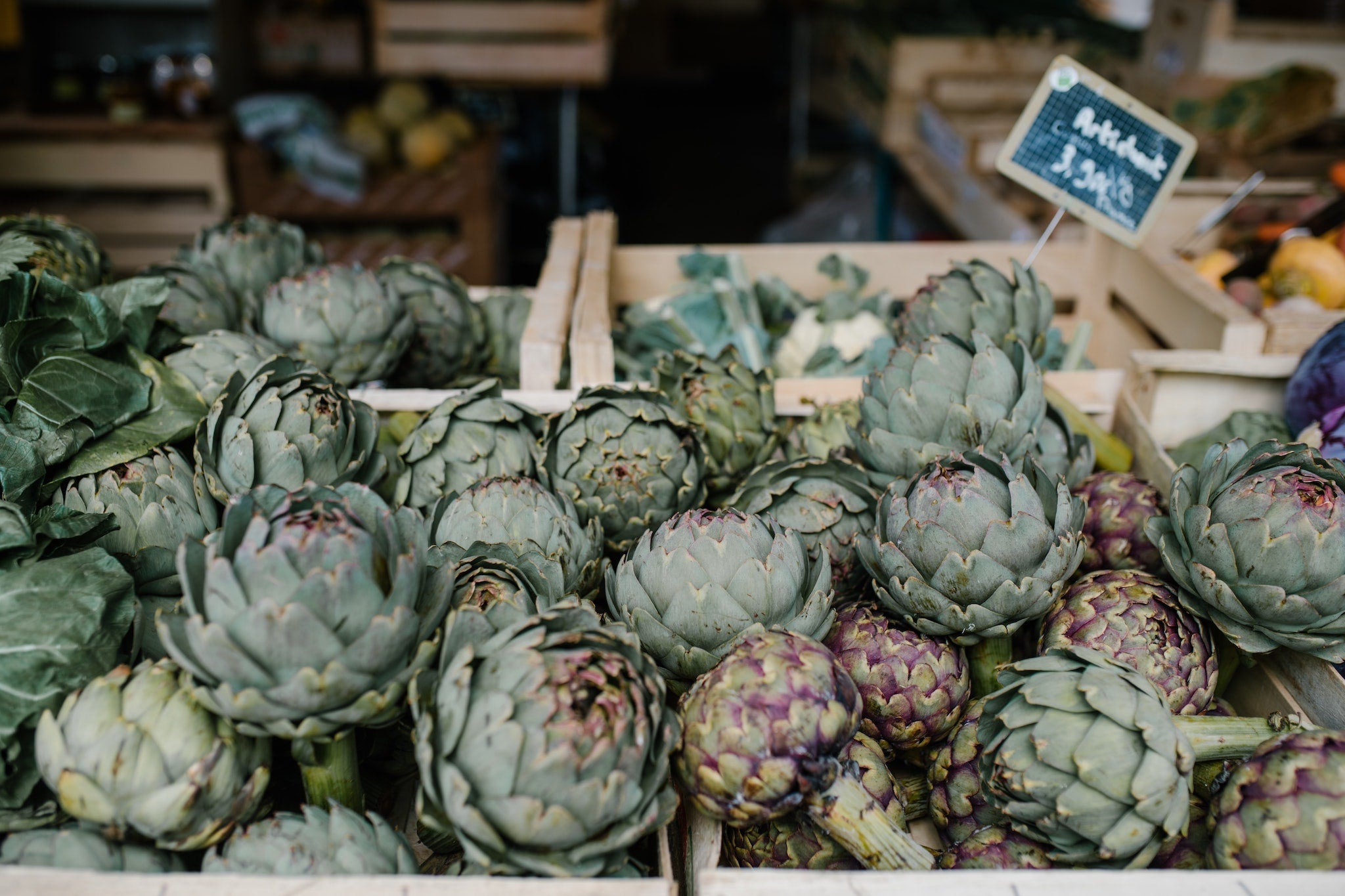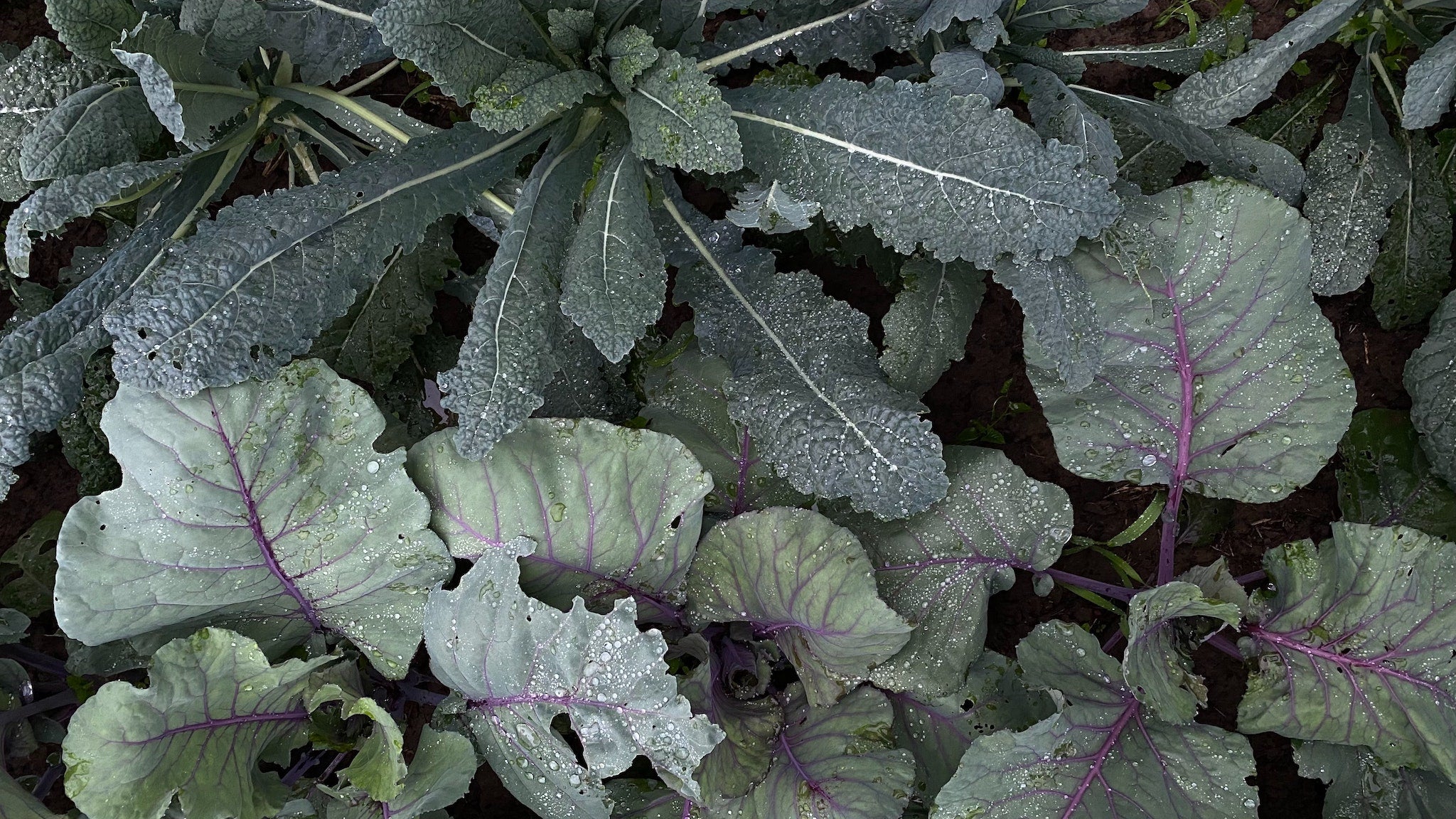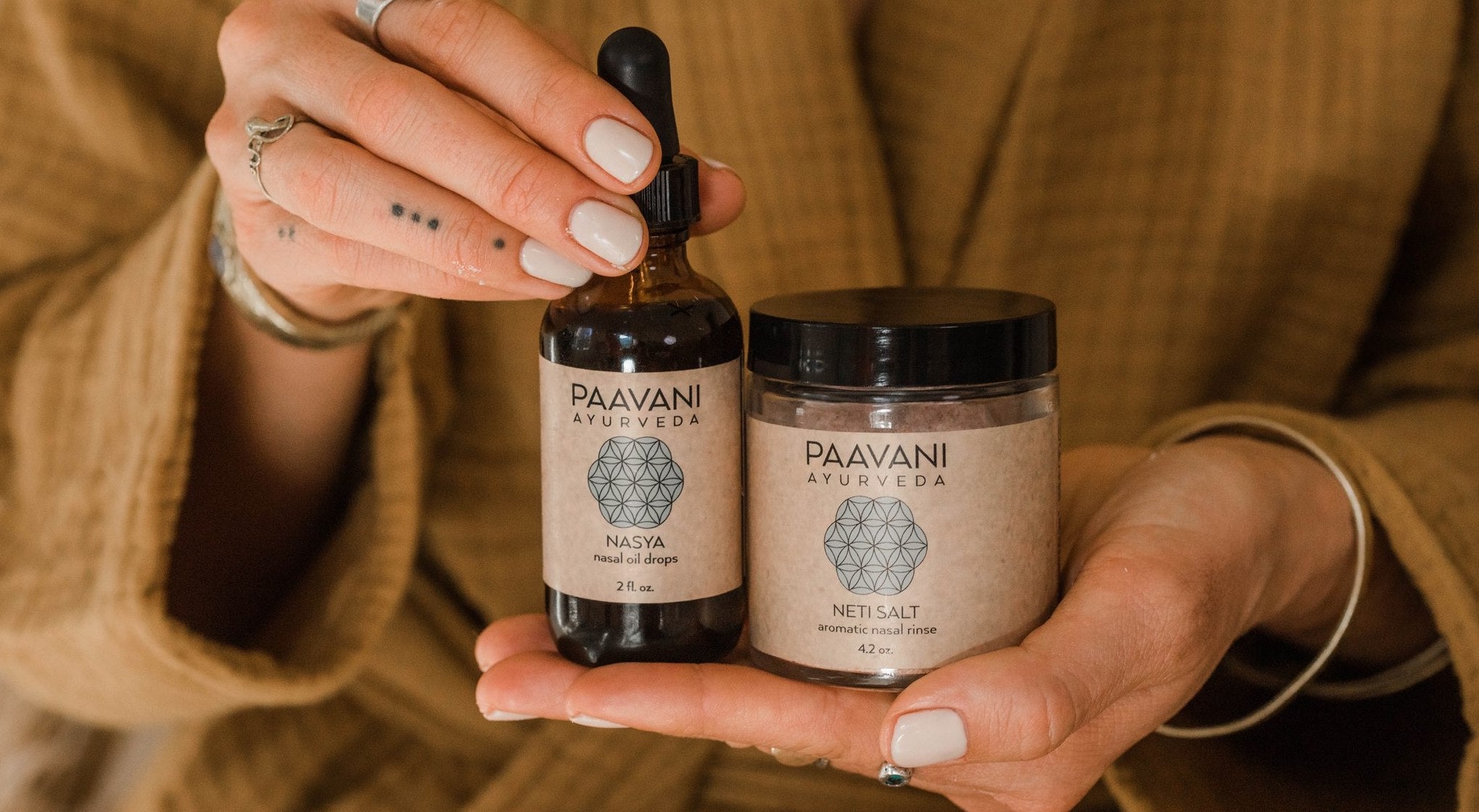
Kapha Balancing Foods List
When kapha dosha is in excess in the body and/or mind, Ayurvedic medicine emphasizes eating the right foods accompanied by the appropriate spices to regain alignment. Below, we have assembled a kapha balancing food list to be available as your guide when you are focusing on restoring harmony to kapha dosha. As you scroll through our list you will notice that emphasis is placed on favoring foods that are light, dry and heating in nature and avoiding foods that are heavy, moist and cold to best balance kapha dosha. The astringent, bitter and pungent tastes are recommended, while the sweet, sour and salty tastes are less advised.
To learn more about your dosha and if kapha may be out of balance, take our Discover Your Dosha Quiz. Additionally, we encourage you to take your wellness journey to the next level by downloading our Introduction to Ayurveda Class or booking an Ayurvedic consultation with our Clinical Ayurvedic Specialist, Laurel Odom.
OILS
Kapha dosha is the only dosha that is not recommended to solely cook with oils when preparing food. Instead, people who are predominant in kapha dosha or are currently experiencing an imbalance in kapha are recommended to steam their foods rather than saute them in oil. This way, the heavy nature of most oils will not weigh down the already dense qualities of kapha. Despite this fact, there are certain oils that are still considered to be light, dry and heating, therefore making them beneficial at supporting kapha dosha. We recommend using the following oils in small quantities.
BEST OILS FOR KAPHA:
Safflower
Sunflower
Mustard
Corn
SPICES
Spices are essential for optimal digestion as they help to kindle agni (digestive fire) and prepare the gastrointestinal tract for the intake, absorption and assimilation of food. Thus, spices should be enjoyed as a digestive churna and also incorporated into snacks and meals. For a simple way to incorporate kapha balancing spices, try our Kapha Spice Blend! It is an excellent cooking companion and is designed by Ayurvedic herbalists to stimulate agni, support healthy kapha digestion and detoxify excess kapha dosha.
BEST SPICES FOR KAPHA:
Turmeric
Ginger
Cinnamon
Dried chili pepper flakes
Clove
Asafoetida
Paprika
Black pepper
Pippali
Rosemary
Tarragon
Oregano
Thyme
Marjoram
Mustard seeds
Cayenne
Saffron
Peppermint
Garlic
Ajwan
Bay leaf
Carraway
Coriander
Cardamom
VEGETABLES
When selecting kapha pacifying vegetables, favor ones that have light, dry, warm and pungent properties like leafy greens, parsley and radishes. Avoid veggies that possess sweet, moist, dense and heavy qualities like sweet potatoes, butternut squash and yams. Cooked vegetables are best for balancing kapha dosha while raw, cold vegetables should be avoided as they can be difficult to digest. This being said, if you are going to eat raw vegetables, we highly recommend eating them at noon when your agni (digestive fire) is at its peak.

BEST VEGETABLES FOR KAPHA:
Mustard greens
Parsley
Radish
Parsnips
Onion
Garlic
Chili peppers
Artichoke
Asparagus
Kale
Broccoli
Cauliflower
Brussels sprouts
Peas
Green beans
Eggplant
Corn
Cabbage
Celery
Lettuce
Spinach
Tomatoes
Turnips
Turnip greens
Sprouts
Rutabaga
Watercress
Wheatgrass
Okra
GRAINS
In Ayurvedic medicine, grains are understood to help strengthen and fortify the tissues of the body; however, kapha dosha is already a strong and steady constitution. This means that a small quantity of grains are recommended for people who are predominant in kapha or are focusing on pacifying kapha dosha. Choose to fill your plate with a small portion of grains, and instead increase your amount of vegetables. Enjoy light and dry grains like the ones shared below, to support and maintain healthy kapha.

BEST GRAINS FOR KAPHA:
Quinoa
White rice
Buckwheat
Millet
Amaranth
Barley
Corn
Rye
Polenta
Wheat bran
Seitan
Tapioca
Crackers
Toast
Muesli
Dry cereals
Granola
BEANS & LEGUMES
Beans and legumes have light and dry qualities which can help absorb the excess moisture associated with kapha dosha, hence, there is a plentiful selection that one can enjoy while balancing kapha dosha. Please keep in mind that you want your beans and legumes to be well cooked and spiced to best support optimal absorption, assimilation and digestion of this astringent food group.

BEST BEANS & LEGUMES FOR KAPHA:
Mung beans
Aduki beans
Black beans
Lima beans
Navy beans
White beans
Black eyed peas
Pinto beans
Split peas
Split pigeon peas (toor dahl)
Chickpeas
Red lentils
Brown lentils
Soy
Tofu
Tempeh
MEAT & EGGS
In Ayurvedic medicine, meat is solely recommended for healing purposes or when there are no other food options available. Meat may be consumed when someone is severely depleted, weak and/or convalescing. Further, meat and eggs are generally recommended in Ayurvedic medicine when one is experiencing a vata, pitta or vata/pitta imbalance. This means that meat and eggs are not recommended to pacify kapha dosha as they are too sweet, dense and moist. In spite of these Ayurvedic facts, if you are a meat eater, there are meats that have lighter, drier qualities that will not imbalance kapha dosha if consumed in moderation. Please note that eggs are considered to be tridoshic in nature, or balancing to all three doshas.
BEST MEATS & EGGS FOR KAPHA (enjoy in small quantities):
Eggs
Chicken (white meat)
Turkey (white meat)
Venison
Fish (freshwater)
Shrimp
DAIRY & NUT MILKS
It is generally recommended to eliminate or reduce the amount of dairy in one’s diet when aiming to pacify kapha dosha. This is because dairy has a sweet and heavy effect on the body which can weigh down kapha and increase mucus production. Nonetheless, if selecting dairy products, Ayurveda recommends choosing products that are fresh, unprocessed and warm to best support easy digestion and the intake of prana (life force energy). Since hard cheeses need to be aged for 6 months or more, Ayurveda does not consider hard cheeses like parmesan or sharp cheddar to have much prana. Additionally, hard cheeses clog the nadis, the channels in which prana flows in the subtle body; thus, Ayurveda does not recommend hard cheeses for any of the doshas. In contrast, soft cheeses are considered fresh and sattvic (harmonious) in Ayurvedic nutrition. Dairy is best enjoyed warm because cold dairy products like a chilled glass of milk can reduce or completely put out one’s agni, pushing kapha dosha out of balance. If consuming dairy, it is also best to have it at least one hour away from meals and with spices to support optimal digestion.
BEST DAIRY & NUT MILKS FOR KAPHA (enjoy in small quantities):
Best choices
Almond milk (unsweetened)
Hemp milk (unsweetened, used warm)
Traditional diluted buttermilk (takra, used during the day)
Light alternatives
Rice milk (used warm, not overly sweet)
Occasional
Fresh, unsalted goat cheese (small amounts)
NUTS & SEEDS
Renowned Ayurvedic physician, Dr. Vasant Lad recommends that all doshas consume nuts in small quantities, as they can be difficult to digest. When pacifying kapha, one may choose to eliminate nuts completely from the diet and instead favor seeds in small amounts as they are light and dry in nature.

BEST NUTS & SEEDS FOR KAPHA:
Charole nuts
Sunflower seeds
Pumpkin seeds
Flax seeds
Chia seeds
Popcorn (unsalted, no butter)
FRUITS
In Ayurvedic medicine, fruits are considered to be purifying due to their light and etheric nature; therefore, although inherently sweet, fruits can still help to balance kapha dosha. When selecting fruits to pacify kapha, stick to astringent, mildly sweet, sour, pungent and tart fruits like cranberries, pomegranate and grapefruits while avoiding heavy, dense, moist and sweet fruits like melons, bananas and coconut. In accordance with proper Ayurvedic food combining, always consume fruits away from meals, enjoying them separately as a snack.

BEST FRUITS FOR KAPHA:
Apples (granny smith)
Applesauce
Pomegranate
Apricots
Cherries
Cranberries
Raspberries
Grapefruit
Rhubarb
Tamarind
Prunes
Raisins
Figs (dry)
Persimmons
Lemons
Limes
Grapes* (red, purple and/or black)
Strawberries*
Peaches*
Pears*
*in moderation
SUGARS/SWEETENERS
As you might have guessed, sugars contain the sweet taste and, for better or for worse, the sweet taste is not supportive to pacifying kapha dosha. This means that all sugars are best to be avoided with raw honey being the only exception. According to Ayurveda, raw honey has light, dry and heating actions in the body making it the only acceptable sugar or sweetener to utilize when working to balance kapha. Additionally, raw honey can help boost metabolism and support lung health, making it even more supportive to kapha imbalances. Please note that Ayurvedic medicine advises against heating, cooking or baking with honey as this creates ama or toxicity due to a chemical reaction which occurs once honey is heated to a high temperature. If enjoying raw honey in a hot beverage, wait until the liquid has come to a drinkable temperature before adding in your smidge of honey.
BEST SUGARS/SWEETENERS FOR KAPHA:
Honey* (raw)
*in moderation
We hope that you enjoy incorporating these kapha-friendly foods into your meals! Please keep in mind that this list is merely a starting off point to begin with, but that ultimately it is most important to listen to your body and your gut to see what is best for you. Pay attention to any digestive disturbances that you may experience when eating certain foods. Keeping a food journal can be a great way to assess what does and does not work for you and your digestive system. Also, if you are not currently working to balance a particular dosha, then it is recommended to eat in alignment with the seasons. Buen Provecho!
PRODUCTS FOR BALANCING KAPHA
Hero image photo by Julia Volk: https://www.pexels.com/photo/ripe-artichokes-in-boxes-in-market-5273463/
Kale Photo by Marina Leonova: https://www.pexels.com/photo/wet-leaves-of-kale-plants-9465758/
Granola Photo by Rachel Claire: https://www.pexels.com/photo/bowl-with-delicious-muesli-with-milk-4846155/
Chickpea Photo by Cup of Couple from Pexels: https://www.pexels.com/photo/a-close-up-shot-of-chickpeas-in-a-bowl-7656561/
Sunflower Seed Photo by João Jesus: https://www.pexels.com/photo/brown-seeds-on-blue-ceramic-bowl-1080067/
Pomegranate Photo by Disha Sheta: https://www.pexels.com/photo/red-pomegranates-3191058/





2 comments
@Claudia, thank you so much for the feedback. We are happy you found this blog informative!
PAAVANI Ayurveda
Thanks for the information, I appreciate it, as I read I understood why my body and energy feels of balance. Thank you.
Claudia
Leave a comment
This site is protected by hCaptcha and the hCaptcha Privacy Policy and Terms of Service apply.